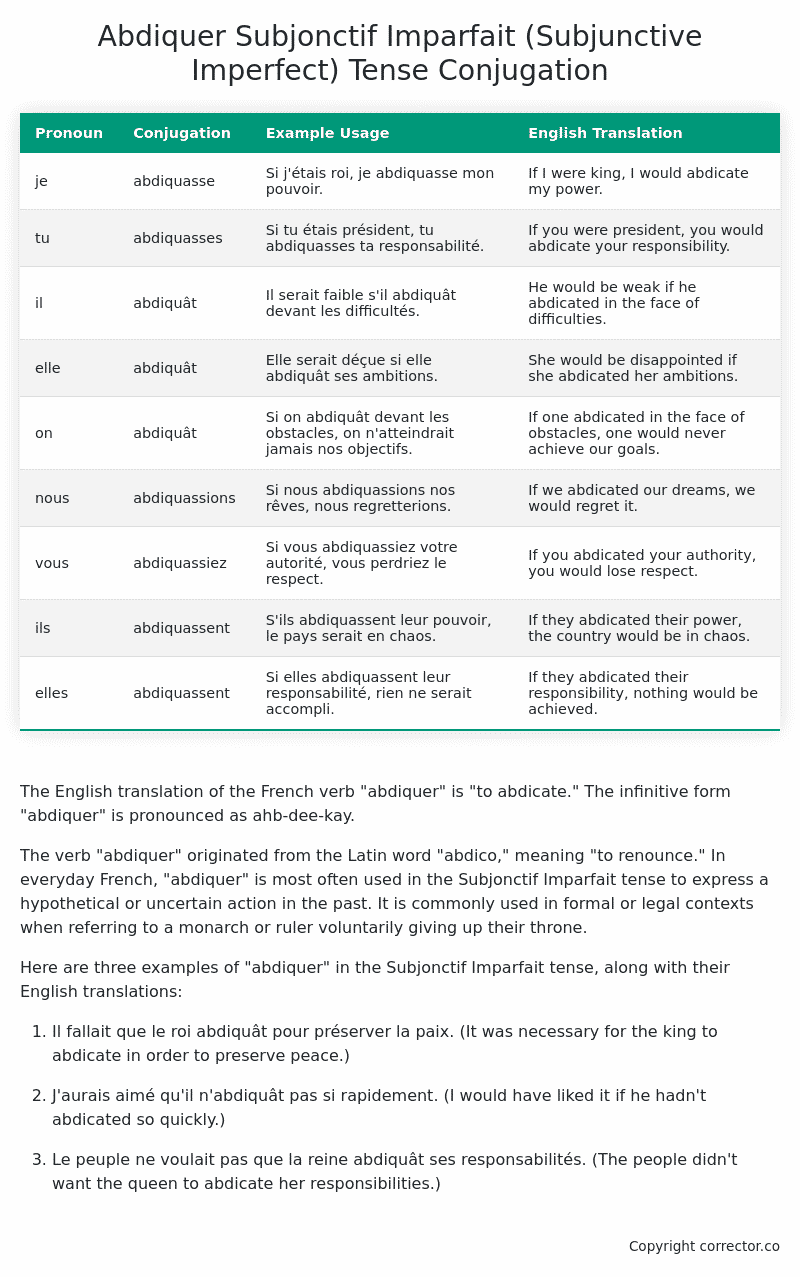Subjonctif Imparfait (Subjunctive Imperfect) Tense Conjugation of the French Verb abdiquer
Introduction to the verb abdiquer
The English translation of the French verb “abdiquer” is “to abdicate.” The infinitive form “abdiquer” is pronounced as ahb-dee-kay.
The verb “abdiquer” originated from the Latin word “abdico,” meaning “to renounce.” In everyday French, “abdiquer” is most often used in the Subjonctif Imparfait tense to express a hypothetical or uncertain action in the past. It is commonly used in formal or legal contexts when referring to a monarch or ruler voluntarily giving up their throne.
Here are three examples of “abdiquer” in the Subjonctif Imparfait tense, along with their English translations:
-
Il fallait que le roi abdiquât pour préserver la paix.
(It was necessary for the king to abdicate in order to preserve peace.) -
J’aurais aimé qu’il n’abdiquât pas si rapidement.
(I would have liked it if he hadn’t abdicated so quickly.) -
Le peuple ne voulait pas que la reine abdiquât ses responsabilités.
(The people didn’t want the queen to abdicate her responsibilities.)
Table of the Subjonctif Imparfait (Subjunctive Imperfect) Tense Conjugation of abdiquer
| Pronoun | Conjugation | Example Usage | English Translation |
|---|---|---|---|
| je | abdiquasse | Si j’étais roi, je abdiquasse mon pouvoir. | If I were king, I would abdicate my power. |
| tu | abdiquasses | Si tu étais président, tu abdiquasses ta responsabilité. | If you were president, you would abdicate your responsibility. |
| il | abdiquât | Il serait faible s’il abdiquât devant les difficultés. | He would be weak if he abdicated in the face of difficulties. |
| elle | abdiquât | Elle serait déçue si elle abdiquât ses ambitions. | She would be disappointed if she abdicated her ambitions. |
| on | abdiquât | Si on abdiquât devant les obstacles, on n’atteindrait jamais nos objectifs. | If one abdicated in the face of obstacles, one would never achieve our goals. |
| nous | abdiquassions | Si nous abdiquassions nos rêves, nous regretterions. | If we abdicated our dreams, we would regret it. |
| vous | abdiquassiez | Si vous abdiquassiez votre autorité, vous perdriez le respect. | If you abdicated your authority, you would lose respect. |
| ils | abdiquassent | S’ils abdiquassent leur pouvoir, le pays serait en chaos. | If they abdicated their power, the country would be in chaos. |
| elles | abdiquassent | Si elles abdiquassent leur responsabilité, rien ne serait accompli. | If they abdicated their responsibility, nothing would be achieved. |
Other Conjugations for Abdiquer.
Le Present (Present Tense) Conjugation of the French Verb abdiquer
Imparfait (Imperfect) Tense Conjugation of the French Verb abdiquer
Passé Simple (Simple Past) Tense Conjugation of the French Verb abdiquer
Passé Composé (Present Perfect) Tense Conjugation of the French Verb abdiquer
Futur Simple (Simple Future) Tense Conjugation of the French Verb abdiquer
Futur Proche (Near Future) Tense Conjugation of the French Verb abdiquer
Plus-que-parfait (Pluperfect) Tense Conjugation of the French Verb abdiquer
Passé Antérieur (Past Anterior) Tense Conjugation of the French Verb abdiquer
Futur Antérieur (Future Anterior) Tense Conjugation of the French Verb abdiquer
Subjonctif Présent (Subjunctive Present) Tense Conjugation of the French Verb abdiquer
Subjonctif Passé (Subjunctive Past) Tense Conjugation of the French Verb abdiquer
Subjonctif Imparfait (Subjunctive Imperfect) Tense Conjugation of the French Verb abdiquer (this article)
Subjonctif Plus-que-parfait (Subjunctive Pluperfect) Tense Conjugation of the French Verb abdiquer
Conditionnel Présent (Conditional Present) Tense Conjugation of the French Verb abdiquer
Conditionnel Passé (Conditional Past) Tense Conjugation of the French Verb abdiquer
L’impératif Présent (Imperative Present) Tense Conjugation of the French Verb abdiquer
L’infinitif Présent (Infinitive Present) Tense Conjugation of the French Verb abdiquer
Struggling with French verbs or the language in general? Why not use our free French Grammar Checker – no registration required!
Get a FREE Download Study Sheet of this Conjugation 🔥
Simply right click the image below, click “save image” and get your free reference for the abdiquer Subjonctif Imparfait tense conjugation!

Abdiquer – About the French Subjonctif Imparfait (Subjunctive Imperfect) Tense
Formation
Common Everyday Usage Patterns
Interactions with Other Tenses
Subjonctif Présent
Indicatif Passé Composé
Conditional
Conditional Perfect
Summary
I hope you enjoyed this article on the verb abdiquer. Still in a learning mood? Check out another TOTALLY random French verb conjugation!


